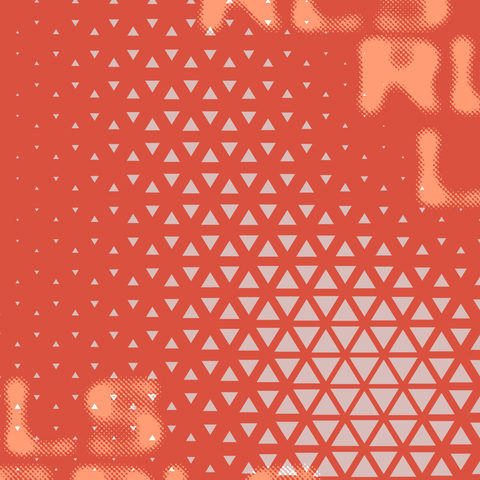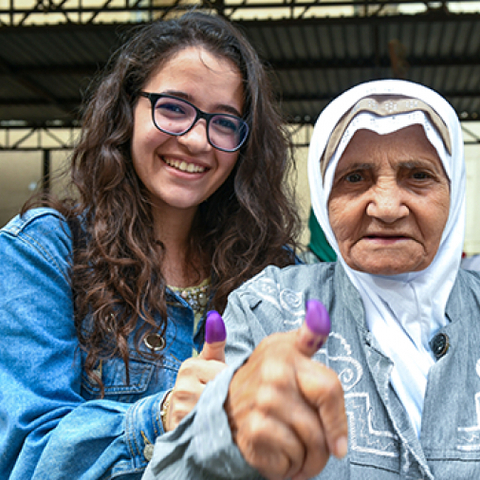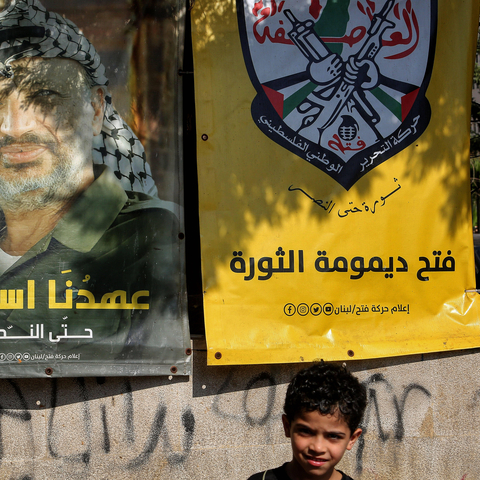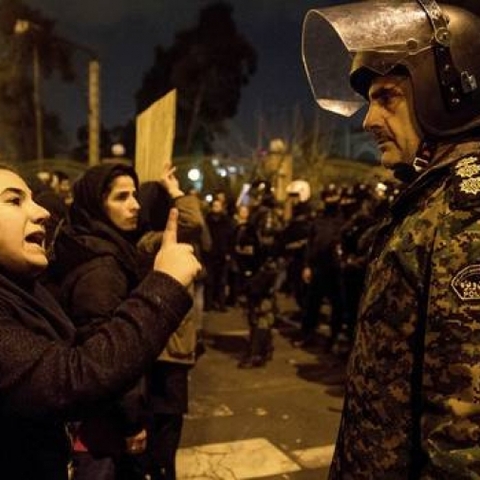Najdeh: A Rich History of Layered Organizing
Najdeh: A Rich History of Layered Organizing
The Association Najdeh is a secular, feminist, democratic organization that has been operating
since 1976. It was established during the Civil War in Lebanon, when women's associations
became necessary for organizing and protecting the most vulnerable.
Since then, the organization has been actively working and advocating to end violence against
women and children, as well as for the Palestinian cause. All Najdeh activities operate with the
framework of cumulating towards the right of return and liberation.
Centers primarily operate in the Palestinian Refugee camps in Lebanon, which are known for
their harsh living conditions resulting from the violent structures created by the history of Israeli
occupation and the Lebanese state as a place of refuge. The women involved in the organization
are part of the communities they serve.
Yalda visited one of their centers in Camp Bourj El Barajneh in the Beirut Suburbs. The center
serves as a social space, a preschool, a psycho social center, and a community space. During
Yalda’s visit, she participated in activities such as dancing the traditional Palestinian dance of
Dabkeh, drawing the flag, and playing a quiz about historical city names, to resist the erasure of
colonization. She also met with Psychologist Rania to learn more about their work, the center,
and the challenges they face.
Yalda: Tell me a bit about yourself, about Najdeh, and how you got here.
Rania: I studied psychology at a Lebanese University. As one of the top students, the university
chairman asked me if I was interested in social work, and I enthusiastically accepted. I started
working briefly, for 6 months, in Tyre with Syrian refugees in Palestinian camps and then joined
the project here in Beirut in 2015.
My role is mainly that of social psychologists and social support provider. My colleagues and I
are responsible to help children address the traumas they experienced in their home countries, as
well as the retraumatizing conditions of migrating and living in camps. Most of the children we
work with were born in the camps, some arrived as young as a few weeks to a few months old.
Many of them went through traumatizing experiences during their journey to Lebanon, as they
often had to traverse dangerous routes to get here, through rough mountain terrains and often
under harsh weather conditions. We are dealing with an entire generation alienated from their
homes, their histories, and deprived from a sense of belonging. They don't even have pictures of
their home country or their own houses, and they may not have any relatives left alive there.
Holistic Practices of Reaching Communities
Yalda: How is Najdeh able to reach the people you want to help?
Rania: One way we reach children is by conducting cultural and artistic activities for them, such
as games, yoga, and dancing, on occasions such as earth day & Nakbah day. The activities are
designed in a way to help them express their feelings, build confidence, and communicate.
Another way is through getting referrals from other organizations, mainly through the Child
Protection Network in the camp.
We also get children through offering services to their parents, like life skills sessions for
parenting, which we have named “positive parenting”. This also helps build trust with them to
leave their children here.
Then we go to the UNRWA schools. We do some activities, we visit, and the schools refer some
kids to us, mostly because UNRWA has a full list and they need to work with these kids.
We also tailor our working hours to the children’s availability. We have two groups of children,
one in the morning and another in the afternoon. Palestinian children come to us in the afternoon,
as they’re usually in school during the mornings.
Syrian children are not allowed to attend school with Lebanese children in the morning, so they
attend it in the afternoon. We open the center at 8 o'clock, and the activities begin at 10 o'clock in
the morning. The children eagerly wait at the gate from 8 o'clock onwards, even during Ramadan
when the entire camp is asleep. They love coming here.
Yalda: How do you identify if a child is struggling?
Suzan: Our animators are trained to identify children who need help. They can recognize signs of
trauma through drawings, body language, and interactions with peers. If they detect a child who
may need support, they inform us, and we conduct an assessment, then either provide them with
additional services in-house or we refer them somewhere else if we don’t have the capacity to
deal with their specific problem.
Yalda: How does the community in the camp evolve, considering the challenges of
addressing children's trauma and women's rights in a patriarchal society?
Rania: The community in the camp is gradually evolving, although there are still many
confrontations within the community. Women face limited mobility, making it harder to engage
them in our programs directly. However, with some activities having a focus on children, it
makes it easier for women to come to us in relation to their children, as mothers.
Some of our animators, like Iman, grew up in the camp and are now working with us. This
creates a sense of familiarity and trust among the community members. Iman's mother used to
make coffee for us, and she herself learned sewing skills here. Many people in the community
have a connection to our center because they were once children who participated in activities
here.
Yalda: You mentioned celebrating various days that bring everyone together. Could you tell
me more about that?
Rania: We use a holistic approach to target the whole neighborhood and the whole community.
There is something for you here, whoever you may be. If you’re a job seeker, we have a program
foremployability-enhancing skills, and basic literacy and numeracy for both men and women. If
you’re a family member, we tackle domestic issues, such as marital conflicts or building
self-confidence among children. Our center strives to cover various aspects of life in the camp,
including entertainment and cultural celebrations.
We target everyone, teenagers, kids, and adults from all backgrounds and education levels.
Palestinians face limitations when it comes to employment opportunities, so we also provide
that. However, even with our support, they are still confined to working within the camp, and it’s
illegal for them to work in most domains outside. The Lebanese state forbids them from joining
syndicates and unions, or working in entire professions, other than restricting their movement. It
doesn't make sense that despite having studied and acquired skills, they are denied the
opportunity to utilize them.
Violations on The Rights to Everything
Yalda: If Palestinians are not allowed to work in Lebanon what is the purpose of their
education?
Rania: The limitations on civil rights are indeed unjust. Palestinians are also unable to own
property outside the camps or pursue careers in various fields. This is why organizations like
Najdeh play a crucial role in supporting the right to work for Palestinians within the camp.
Although they can work within the camp without explicit permission, their salaries are often
limited as much of the work is done on a voluntary basis.
Yalda: So you mean that women's liberation and trauma work cannot be separated from
the broader struggle for rights, including education, the right to return, and the right to
work?
Rania: It's all interconnected, and that's why our advocacy work encompasses various aspects.
You cannot solely focus on women's rights or trauma without considering the broader context.
For example, if we work with a woman experiencing domestic violence, we need to understand
that the violence might be rooted in the husband's unemployment due to the economic crisis. In
such cases, we may need to find employment opportunities for both the woman and her husband.
Additionally, if children witness their parents fighting, they experience trauma, and we cannot
overlook their needs. We provide activities and a safe space for children to play, dance, and
express themselves. The community here lacks adequate recreational spaces, so our center
becomes a refuge. The parents may not have the means or ability to take their children out, so
our center becomes a crucial place for them, with the center being free of costs.
The children’s time here may even be positively impacting their studies. If they encounter a
problem understanding a topic from school, they seek help from their beloved animators. The
center provides a sense of safety for the kids, and even their parents feel comfortable coming
here.
Structural Violence, Systemic Injustices, and the Theory behind the Praxis
Yalda: You previously mentioned something called positive parenting. Can you explain what
that entails?
Rania: If we can recognize that the violence against children is high in camps due to structural
violence, due to overcrowding, economic crises, and various political factors, how can we simply
ask parents not to hit their children? Violence is normalized in every detail of day to day life, so it
becomes challenging to ask mothers not to abuse their children when they themselves face
numerous normalized abuses that they have to take care of on top of care-taking duties for their
homes and children.
We also recognize that fathers contribute to the abuse and violence within the family. In the
Right Woman Project, we target men as well women. We organize sessions specifically for
fathers, focusing on positive parenting. These sessions aim to educate fathers on nonviolent
parenting methods, promoting the well-being of their children. We discuss topics such as
managing anger and stress, as well as alternative ways of parenting.
It's crucial to acknowledge the frustrations and the challenges parents here face in providing for
their families. I'll give you an example of a skilled car mechanic. He works for a Lebanese
employer because he is not allowed to operate his own business outside the camp. So, if
someone's car breaks down, they go to the Lebanese mechanic who charges them $500, while he
only receives $20 for his work. Despite working long hours, he struggles to support his family.
Education might not be a viable option for him because even if he becomes a lawyer, he would
likely end up working menial jobs, and still being underpaid. That's why we target not only
mothers but also fathers in our efforts to promote positive parenting and address the larger issues
affecting families in the camps.
Yalda: So this is not about parenting then, it brings awareness to the systematic roots of
their own trauma and anger, which they seem to project on their children?
Rania: These parents love their children, but they struggle to understand how to treat them in a
nonviolent way. Initially, when we asked women to encourage their husbands to join our
sessions, they were hesitant and thought it was a crazy idea. However, as they started
experiencing healing and improvement themselves, they became more open to the idea of
therapy for their husbands.
Some men did attend the sessions, while others did not. We have seen positive examples where
the men who participated brought their neighbors or relatives along, spreading the impact further.
It may be small steps, but it breaks the taboo and allows men to acknowledge their own
vulnerabilities and challenges. They learn that it's okay to be vulnerable and that they don't have
to suppress their emotions or to fear expressing themselves.
Identities, Oppressions, and Intentional Solidarity
Yalda: The patriarchal system affects all men., The inability to cry or express emotions
may lead them to channel their feelings through anger?
Rania: They might not be able to express themselves due to the structural violence they
experience. Consequently, they may express their frustrations outwards on their wives and
children. Breaking this chain of violence starts within the family. I often address this issue when
I work with team leaders, explaining to them how home environment can influence children's
behavior. For example, if they display excessive care-taking or bullying behaviors towards their
friends, it could be a reflection of them bearing witness to issues at home. Stopping the cycle of
violence is not easy, but if children understand that their parents' actions are not their fault and
are a result of their own struggles, it can create some positive change, even if it's gradual.
Yalda: So what I understand is that the problems faced vary depending on the role
individuals have within the family and community?
Rania: The challenges and issues faced by different individuals vary based on their ages and
social identities. For example, Syrian children often come with fear, trauma, bed-wetting, and
ADHD symptoms. On the other hand, the main problem for many Palestinian children, according
to my observations, was convincing them to stay in school. They often fight with their parents
because they want to work and earn money. They want to be able to afford necessities, and go
places their parents cannot take them. They struggle to see the value in completing their
education. This issue has occupied us for about five years. We’re working with parents and
children to address this conflict and ensure they stay in school.
In some cases, when I visit secondary schools, I see a 6th-grade child who doesn't even know
how to write their name. The lack of motivation stems from the belief that their future lies
outside Lebanon, outside the Arab countries, and often involves risky journeys seeking a better
life elsewhere. This sense of hopelessness leads to sadness, depression, anxiety, and a tendency
to isolate themselves. In my observations of Palestinian children, there is also a lot of violence
among them. They engage in violent play and use violent language. When you talk to a
Palestinian child, they may express a belief that there is no future for them in their current
circumstances. This is the prevailing mentality due to the harsh daily reality they face.
The Importance of Intentional, International Solidarity as Praxis
Yalda: So how do you address the loss of perspective among these Palestinian children and
teenagers?
Rania: What helps them is intentional solidarity and support. One thing I love is that every year,
Japanese children send presents for Palestinian children. When a child like Iman receives a
package, it contains various items like towels, papers, pencils, crayons, and heartfelt messages.
The package carries the name of the child who sent it and their wishes for the Palestinian boy or
girl. When Iman received such a package during her time at Najdeh, it brought back memories of
her own childhood. Now, her own children receive these gifts, and the scent of the items reminds
her of her past. This gesture serves as a reminder to the children that they are not alone and that
they have the support of people from around the world, even in Japan, who are aware of their
difficult circumstances. It teaches them to be brave and resilient, knowing that others care about
them and their well-being.



